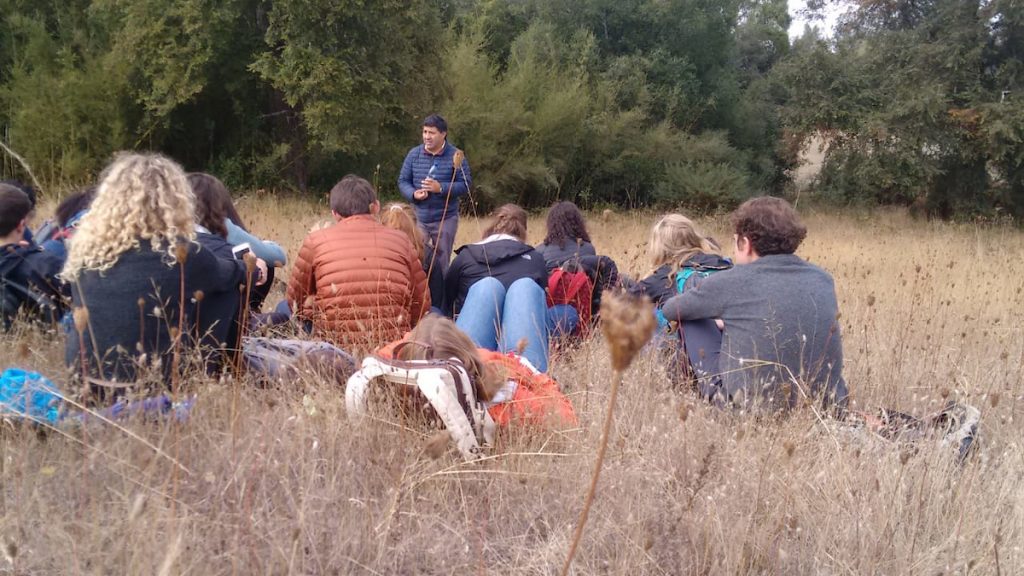Study abroad sector lags on sustainability, research shows
Here are five steps that can advance the field
June 6th, 2022 | School for International Training, SIT Graduate Institute, SIT Study Abroad

Megan Zacher completed her MA in Sustainable Development with SIT Graduate Institute in May 2022. This post is a summary of her capstone research. Visit the SIT Capstone Collection to read her full findings.
By Megan Zacher
As a result of recent global events—including the COVID-19 pandemic, racial equality reckoning, and general climate change—the world has begun to shift its focus toward planning for a more sustainable future. However, the study abroad industry remains largely behind the curve, only just beginning to consider its role in influencing and developing sustainability practices and mindsets for students engaged in higher education studies. While the value of study abroad is evident, there are inherent contradictions to the practice as it exists today.
Literature on the topic of the environmental impact of international student mobility suggests that higher education institutions are at a crossroads of the sustainability issue due to their implicit involvement in systems that rely on a carbon-based, capitalist economy and their status as centers of innovation, knowledge, and technology*.
While the value of study abroad is evident, there are inherent contradictions to the practice as it exists today.
Additionally, annual greenhouse gas emissions associated with student study abroad travel are equivalent to the annual emissions of a small- to mid-sized country such as Jamaica or Tunisia, according to a 2019 study*.
Some institutions have begun to try to address issues of sustainability with various initiatives. However, there is a general focus on the environmental piece of sustainability and a lack of consideration for the assemblages and externalities of study abroad—namely, its effects on social and economic sustainability.
The positive perspective on study abroad is largely centered around western students from generally wealthy nations who are encouraged to venture abroad to experience something new and broaden their horizons, both literally and figuratively. However, the glorification of study abroad must confront some substantial contradictions in the age of rapidly expanding climate change effects and drastically increased social and economic inequality.
Annual greenhouse gas emissions associated with student study abroad travel are equivalent to the annual emissions of a small- to mid-sized country ...
Through 15 semi-structured interviews of key informants in the field, this research sought to gather perspectives on sustainability in the education abroad field. Analysis of those interviews determined that study abroad stakeholders are primarily focused on measuring the impact and benefit of study abroad as it relates to student outcomes. The research also found that while participants in this study were generally aware and perceptive of sustainability issues in their work and study abroad in general, tangible efforts to confront those issues were implemented inconsistently in offices, institutions, and the field more broadly.
Participants tended to employ a disparate effort to address sustainability in their work, noting a handful of concrete measures such as carbon offsetting, marketing and conference efforts, transportation method studies, and virtual education abroad, taken to make programs more sustainable, but not following a standard policy across their office, institution, or sector.
Participants also argued that the negative impacts of study abroad are outweighed, or at least balanced, by the positive benefits received by the students who take part in the travel, learning from local communities and taking that knowledge with them throughout their lives. This finding suggests a certain level of cognitive dissonance in the field and a willingness to rationalize the negative impacts by relying on perceived benefits.
[Research suggests] sustainability is not at the forefront of priorities for the study abroad field despite general increased engagement with the topic globally.
Finally, although several study participants noted that their institutions or offices were implementing some sustainability measures, several were candid in admitting that those initiatives were put into practice for reasons outside of improved sustainability
Other sustainability measures—like carbon offsets and working with provider organizations—were implemented in an effort to improve student outcomes both from a learning and a safety perspective, suggesting that sustainability is not at the forefront of priorities for the study abroad field despite general increased engagement with the topic globally.

These findings suggest that although stakeholders are aware of and considering the issue of sustainability in their work, the field lacks substantive overarching policies on sustainability that would allow it to enact and enforce measures to offset the field’s negative global impact.
Study abroad remains focused primarily on student learning and outcomes, reflecting a traditional approach to international education that has been in place since the 20th century. As a result, stakeholders feel that the relative impact of study abroad can be counteracted through the integration of sustainability topics into curricula to educate students on those matters and influence them to be more sustainable in the future.
Findings also suggested that when sustainability measures are enacted, they are done so for reasons other than improved sustainability, whether that be financial, the effects of the COVID-19 pandemic, or improved student engagement abroad. And even when these initiatives are implemented, the lack of policy enforcement around them results in a reliance on the goodwill of singular individuals, offices, or institutions to uphold them.
As a result of these findings, we recommend the following next steps for the field as we seek to engage with issues of sustainability in a substantive and effective way:
1. Establish a sector-wide policy outlining concrete sustainability measures to be implemented by higher education institutions, provider organizations, and professional associations. These would include a commitment to existing measures such as carbon offsets, reducing waste and consumption, reciprocity with local partners, and others to influence an immediate improvement of the field’s practices, as well as longer-term actions and goals.
2. Call on the field to sign onto this policy. Signatories will be published publicly to influence higher engagement among stakeholders and allow students to make informed decisions about their place of study.
3. Advance monitoring and evaluation, either through the improvement of existing tools or the development of new instruments in order to assess the complete current impact of the field and existing sustainability initiatives. In conjunction with these evaluations, the field may consider sanctioning signatories who are not meeting established sustainability targets.
4. Research and consider the differences and similarities of in-person and virtual international education opportunities in alignment with expanded global education goals in order to determine whether the learning outcomes are comparable. Doing so may allow the field to implement fewer in-person programs, while still allowing students to gain similar skills and knowledge.
5. Professional associations and other stakeholders with influence should lobby for improved sustainability policies and efforts within the larger industries in which study abroad takes place, such as the aviation and energy sectors. Utilizing both institutional lobbying power and the power of student populations will create an impactful force to create change in these areas, which may allow the field to continue implementation of in-person travel programs.
Utilizing both institutional lobbying power and the power of student populations will create an impactful force to create change in these areas, which may allow the field to continue implementation of in-person travel programs.
As the world continues to confront issues related to climate change and social and economic justice on a global scale, the study abroad sector finds itself at a pivotal point in its history. Stakeholders have the opportunity to learn about the ways in which their practices have broad-reaching effects on the planet and its people, beyond the students who take part in study abroad programming.
It is essential that the field takes this opportunity to think deeply about its engagement with travel and learning, and seeks to transform the practice of studying abroad into one that is regenerative, mutually beneficial, and seeks to do no harm.

*References: Shields, R. (2019). The sustainability of international higher education: Student mobility and global climate change. Journal of Cleaner Production, 217, 594–602. https://doi.org/10.1016/j.jclepro.2019.01.291
